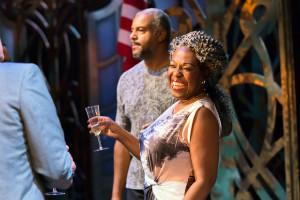Review of The Hotel Cerise at Theatre Royal Stratford East
On paper Bonnie Greer's contemporary American reworking of Chekhov's The Cherry Orchard, set against the dirtiest election campaign of modern times, seems an insightful and arresting idea. Eight years after the election of the first black President, many Americans are asking questions about Obama's legacy, in particular the various black communities who have differing opinions on how far the country has come, and how the 'Hope' that was promised has faded.
The reality of The Hotel Cerise is a missed opportunity -- an incoherent and pointedly deliberate reworking of a classic play that overplays its hand and reduces the debate to broad strokes that are about as appealing as a two-term Trump Presidency. The idea of the cherry orchard itself as a metaphor for the current problem facing the American electorate is astute, yet never properly addressed, and when political parallels are brought up they're done so with the subtlety of a sledgehammer.
The Ranevskaya estate becomes the Hotel Cerise, a past home of aspiring African-Americans which has fallen into disrepair and presided over by the matriarchal Anita Mountjoy who staffs it with undocumented workers and presumably illegal immigrants. In order to motivate a political conversation characters randomly ask who the other will be voting for, sparking limited dialogue between them that never graduates into an interesting level of debate. Political points are played with half a nod to the audience, and whenever a character brings up Black Lives Matter or the Flint water crisis it feels oddly distant and disconnected - the characters never feel like they're in the eye of the storm as well they should.
Chekhovian check-points are systematically ticked off, from the bullishness of the Lopakhin character buying the hotel to the overly stressed conclusion that sees the aged house servant left behind - there's even a ticking clock that fades in and out to show the passing of time. Whilst both plays aim to show stirrings of a coming revolution, Greer's efforts feel artificial and forced, despite enough parallels to warrant the effort.
The often busy stage is poorly directed as characters literally take a step forward when it's their time to speak, never developed enough to fully command their own attention, again created from primary colours. Millenials says words like 'fuck' and 'emoji' to show that they're different from the older generation who attempt to create a false confidence by speaking loudly and in extended metaphors. Awkward freeze frames and dance routines outstay their welcome and the arrival of a ghost does little to ramp up the atmosphere - it's all too bold and self assured, and sadly at times quite amateur in its delivery.
I found the acting to be unanimously overly declamatory and one-dimensional; gone are the inner demons of Chekhov's assembled dramatis persona, everything is played front, centre and just a touch too loud. The cast are unaided by an overly bright scenic design that feels equally flat and a bit shaky.
As the play ends on the eve of the election and the characters ponder on whether a Trump win will bring about the revolution that it has promised, you can't help feel the knot in your stomach tighten. What should be a politically relevant and invigorating discussion on modern America feels flimsy and underdeveloped. Trump may promise to "Make America Great Again" but Greer's adaptation certainly hasn't made Chekhov any greater.
Originally published on
